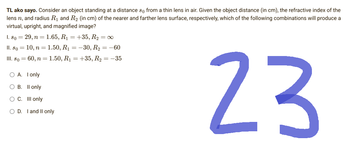Question
TYPEWRITTEN ONLY PLEASE. ILL UPVOTE ONLY IF TYPEWRITTEN, COMPLETE, AND CORRECT. DONT ANSWER IF YOU ALREADY ANSWERED THIS, ILL DOWNVOTE. THANK YOU

Transcribed Image Text:TL ako sayo. Consider an object standing at a distance so from a thin lens in air. Given the object distance (in cm), the refractive index of the
lens n, and radius R₁ and R₂ (in cm) of the nearer and farther lens surface, respectively, which of the following combinations will produce a
virtual, upright, and magnified image?
1. So = 29, n = 1.65, R₁ = +35, R₂ = ∞
II. so = 10, n = 1.50, R₁ =
−30, R₂ = -60
III. so = 60, n = 1.50, R₁ = +35, R₂ = -35
O A.
I only
O B.
II only
23
O C. Ill only
OD. I and II only
Expert Solution
This question has been solved!
Explore an expertly crafted, step-by-step solution for a thorough understanding of key concepts.
Step by stepSolved in 5 steps with 9 images

Knowledge Booster
Similar questions
- Write clearly plsarrow_forwardplease type out your solution so that it is easy to read I have bad eyesight and cant read handwriting well please type do not handwritearrow_forwardSolve accurate dont use ai ok. Follow format strictly ok .substitute must ok. If u dont know Format and correct answers dont solve it ok. Qno1 solve..no handwriting.arrow_forward
- Option C was marked incorrect. Please response.arrow_forwardI having a hard time trying to solve for t since there are decimals. I just dont understand how i would go about doing this. 0.2t2 + 4.997t - 200 =0 Solve for t.arrow_forwardplease if you can write pen and scan clear to read. very gratefull.arrow_forward
arrow_back_ios
arrow_forward_ios